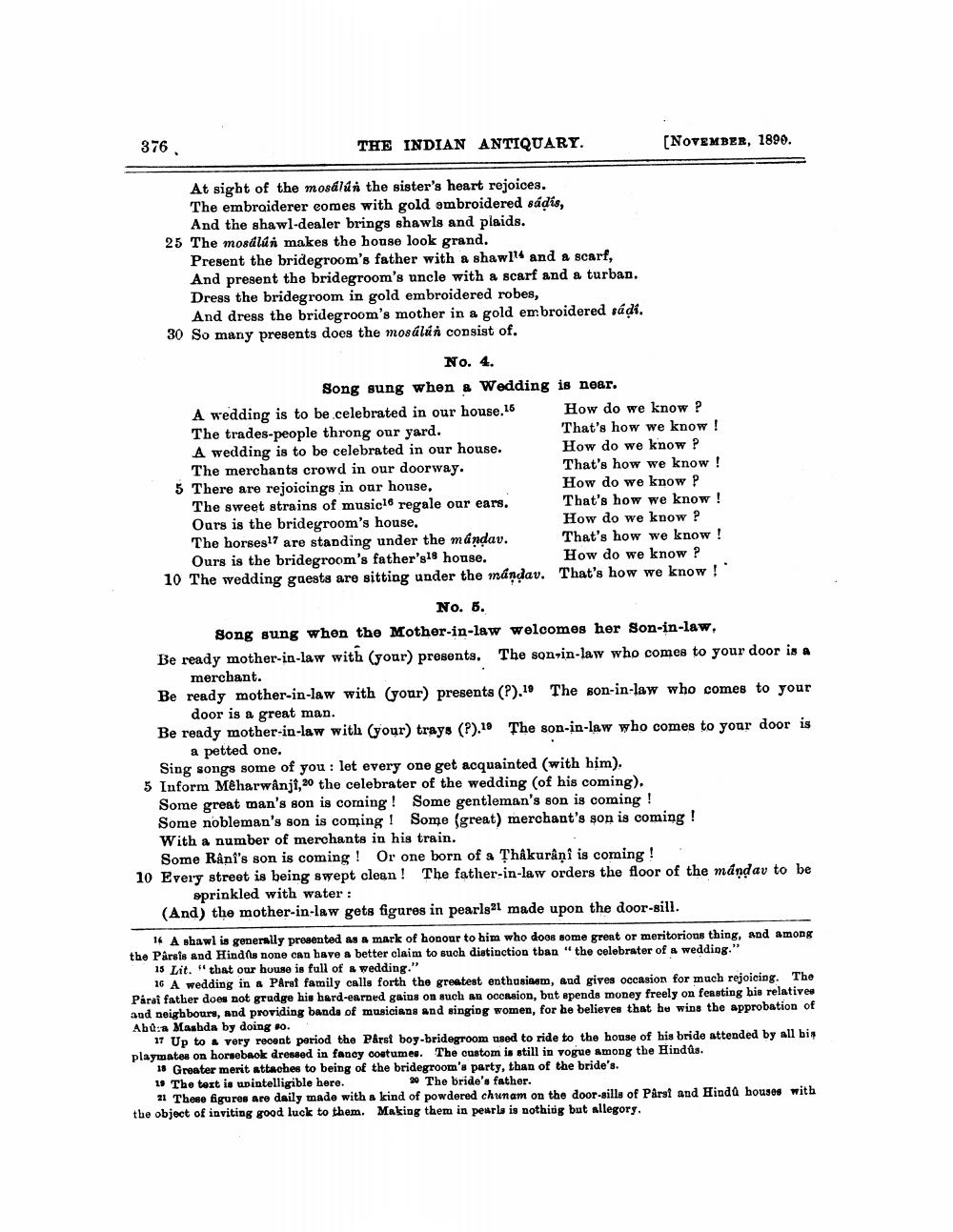________________
376.
THE INDIAN ANTIQUARY.
At sight of the mosálún the sister's heart rejoices. The embroiderer comes with gold embroidered sáḍis, And the shawl-dealer brings shawls and plaids. 25 The mosálún makes the house look grand.
Present the bridegroom's father with a shawl' and a scarf, And present the bridegroom's uncle with a scarf and a turban. Dress the bridegroom in gold embroidered robes,
And dress the bridegroom's mother in a gold embroidered sáḍi. 30 So many presents does the mosálún consist of.
No. 4.
Song sung when a Wedding is near.
A wedding is to be celebrated in our house. 16 The trades-people throng our yard.
A wedding is to be celebrated in our house. The merchants crowd in our doorway.
[NOVEMBER, 1890.
5 There are rejoicings in our house,
How do we know ? That's how we know ! How do we know ? That's how we know ! How do we know ? That's how we know ! How do we know ? That's how we know ! How do we know ?
The sweet strains of musicle regale our ears. Ours is the bridegroom's house.
The horses17 are standing under the mandav. Ours is the bridegroom's father's18 house.
10 The wedding guests are sitting under the mandav. That's how we know !
No. 5.
Song sung when the Mother-in-law welcomes her Son-in-law,
Be ready mother-in-law with (your) presents. The son-in-law who comes to your door is a merchant.
Be ready mother-in-law with (your) presents (?).19 The son-in-law who comes to your door is a great man.
Be ready mother-in-law with (your) trays (?).19 The son-in-law who comes to your door is
a petted one.
Sing songs some of you: let every one get acquainted (with him).
5 Inform Mêharwânjî,20 the celebrater of the wedding (of his coming).
Some great man's son is coming!
Some gentleman's son is coming!
Some nobleman's son is coming! Some (great) merchant's son is coming! With a number of merchants in his train.
Some Rânî's son is coming! Or one born of a Thâkurânî is coming!
10 Every street is being swept clean! The father-in-law orders the floor of the mandav to be sprinkled with water:
(And) the mother-in-law gets figures in pearls21 made upon the door-sill.
14 A shawl is generally presented as a mark of honour to him who does some great or meritorious thing, and among the Pârsis and Hinds none can have a better claim to such distinction than "the celebrater of a wedding."
15 Lit. "that our house is full of a wedding."
16 A wedding in a Pârst family calls forth the greatest enthusiasm, and gives occasion for much rejoicing. The Párai father does not grudge his hard-earned gains on such an occasion, but spends money freely on feasting his relatives and neighbours, and providing bands of musicians and singing women, for he believes that he wins the approbation of Ahû:a Mashda by doing so.
17 Up to a very recent period the Pârst boy-bridegroom used to ride to the house of his bride attended by all his playmates on horseback dressed in fancy costumes. The custom is still in vogue among the Hindus.
18 Greater merit attaches to being of the bridegroom's party, than of the bride's.
19 The text is unintelligible here.
20 The bride's father.
21 These figures are daily made with a kind of powdered chunam on the door-sills of Pârst and Hindû houses with the object of inviting good luck to them. Making them in pearls is nothing but allegory.




